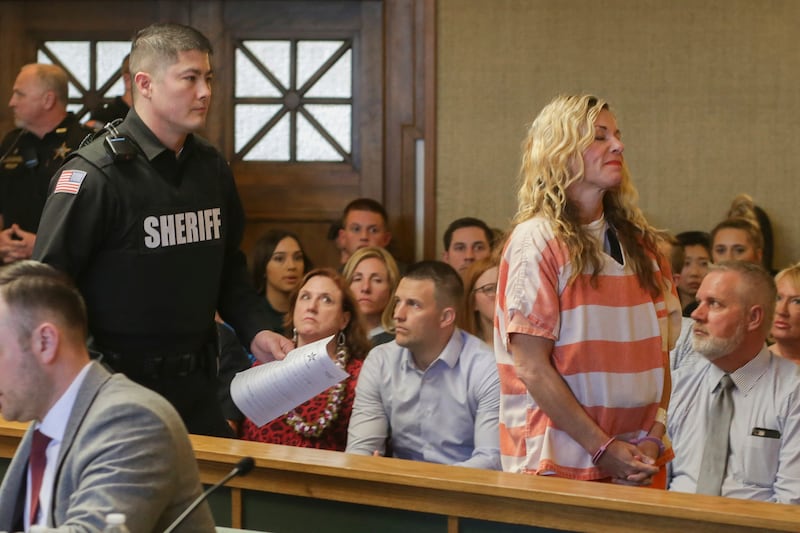Lori Vallow Daybell hasn’t posted bail yet and remains in jail. Why? The bail bonds process is complex and requires a lot of work, which is still being done, according to the owner of one bail bonds company in Rexburg, Idaho.
Last Friday, Vallow Daybell made her first court appearance in Idaho where a judge lowered her bond from $5 million to $1 million. Almost a week later, she hasn’t posted her bail. Reports suggested local bail bonds companies in Idaho chose not to work with her team.
Danielle Kingston, the owner of A+ Idaho Bail Bonds in Rexburg, Idaho, said the $1 million bond is a “big bond for our area,” which must be considered when deciding whether to work with Vallow’s team.
“You have to look at every bond very specifically and individually,” she said.
According to Kingston, her company makes several considerations before deciding whether to work with a detainee, like Vallow. There’s “criteria” to follow. The detainee must “follow the policies” of the company. And, she said, the company will assess the “risk” of the detained individual.
“It doesn’t work out if we don’t feel comfortable,” she said, adding that “you have to get to the point where you feel comfortable enough to write it.”
Kingston said due process is important to anybody sitting in jail. Giving those in jail that due process is her “main focus.”
“We do feel very strongly bail is a noble process. It’s a process that’s been here since the Constitution has been in place,” she said.
Giving out a bond is not just about releasing somebody if they have the money. It’s making sure that they appear in court, too, she said. Companies need to be familiar “with the players, all the family,” so that “we would know where to find her” if she ran, she said.
“The judge took that into consideration and put forth the conditions in order for her bond,” she said.
“If no one’s coming to your aid, if nobody is coming to post your bond, if nobody is surrounding you and saying you’re a good person .... that’s a red flag for a bail bondsman. That’s where you start seeing it either falls apart because nobody is willing to help.
“If you have no family willing to help and no friends willing to help, why would a bail bondsman be willing to help?” Kingston asked. “If we didn't put all the requirements in place ... then we’re risking a great deal. We take that very seriously,” she said.
Working with charged individuals for a bail bond is anything but easy, Kingston said. It’s supposed to be complicated so bondsman and defendants make the best decisions possible.
For example, bail bond companies take on liability for the accused detainee if he or she decided to run after they posted bail, Kingston said.
Bail policies are also different in every state, adding another layer of complication to the process.
For example, the recent bail reform in New York offers a different dynamic. New York’s bail reform, which went into effect Jan. 1, 2020, eliminated pretrial detention and cash bail as an option for about 90% of arrests, according to the Brennan Center, a nonpartisan law and policy institute. Judges maintain the option to set cash bail.
Kingston said “there’s clear issues” with the policy and “makes it a police state.” The court has full control, she said. Bail makes you considered innocent until you can fight your case. Guilty and innocent people alike can be set free under the reform.
That said, the bail reform is expected to decrease pretrial detainees by more than 40%, Vox reports.
In California, the California Replace Cash Bail with Risk Assessments Referendum (SB10) would replace cash bail with risk assessments for detained suspects awaiting trials.
As BallotPedia put it, “The risk assessments would categorize suspects as low risk, medium risk or high risk. Suspects deemed as having a low risk of failing to appear in court and a low risk to public safety would be released from jail, while those deemed a high risk would remain in jail, with a chance to argue for their release before a judge. Those deemed a medium risk could be released or detained, depending on the local court’s rules. SB10 would exempt suspects of misdemeanors, with exceptions, from needing a risk assessment to be released.” The referendum is up for veto for the 2020 ballot.
Though Kingston isn’t a fan of those ideas, she said the most important thing to consider is that the public is safe.
She said she hopes will “everybody stand for justice.” That, she said, is “what we all strive for, and we want to keep that right.”
People need to understand there is a process, Kingston said. Bail bonds companies need to make the right decisions so they can help out every American. Everyone in the United States deserves the right to follow the bail bonds process, she said.
“Our position to bond is a Constitutional right. We take it very seriously,” she said. “It gives you the checks and balances that make our court system work.”
She added, “You are innocent until you are proven guilty.”


